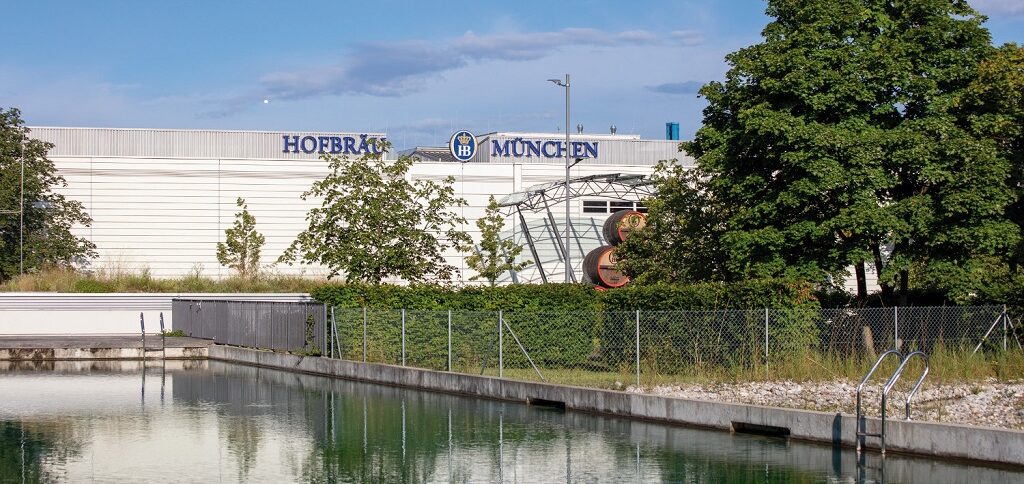The sustainability puzzle at the Munich Hofbräuhaus

Do good and tell people about it. There is still a lot of good to be done in the areas of environmental protection and sustainable production. When it comes to sustainable beer production, the Staatliches Hofbräuhaus in Munich is one of the trailblazers. And yet we hardly ever hear about the many measures being taken there. Why? Because sustainable business is simply common sense according to Dr Michael Möller, technical director, and Sebastian Utz, environmental officer at Hofbräuhaus München.
“We don’t talk about it at the Hofbräuhaus”
The Staatliches Hofbräuhaus in Munich is strongly engaged in environmental protection, but doesn’t use this fact for promotion. Why not? Are consumers not interested?

“Environmental protection is a matter of course for us, so we don’t see the need to talk about it,” says Dr Möller. Hofbräuhaus München has been active in environmental protection for more than 20 years. Initially, the topic was also used in marketing. However, a 2011 study showed that consumers don’t expect green marketing from the brewery. Hofbräu München stands for more traditional values: Bavarian coziness, beer tents, Oktoberfest and the Hofbräuhaus. “A marketing campaign about environmental protection misses our target group. Organic doesn’t work for us and in fact achieves the opposite,” explains Möller. “We consider protecting the environment for future generations to be common sense. Of course the measures can be expensive at times and aren’t always profitable.
However, we have set ourselves the goal of financing all this through our own means – and not making the customer pay for them. No matter how useful reforestation programs in Brazil or Indonesia may be, we want to focus on our region first. We prefer to take many small and important steps here on our doorstep, especially since we have the greater influence here.”
Trailblazers in the brewing industry
Ten years ago, Hofbräuhaus München became the first ever brewery to determine the greenhouse gas emissions of beer along the entire value chain “from the field to the glass.” There is no doubt that making beer produces CO2 emissions. The brewery follows the classic strategy of avoiding, reducing or compensating carbon emissions. In addition to the evolution of brewing techniques, other measures are also contributing to reducing the carbon footprint at Hofbräu München. These include reducing the use of paper, switching the vehicle fleet from fossil fuel to electric mobility, and finally accelerating digitalization – a measure which picked up speed again during the coronavirus pandemic. “Replacing many of the business trips with video conferences has already achieved a lot,” says Dr Möller. “But we have to take people with us and explain a lot. Getting rid of personal printers, for example, was difficult for several people. Individual behavior has to change. And that takes time.” his colleague Utz adds.

Sustainability as a full-time job at the Hofbräuhaus in Munich
Sebastian Utz is responsible for the topic of sustainability at the Hofbräuhaus – a full-time job. In 2015, after studying at Weihenstephan, the brewer from Munich started at the company as an environmental officer and international master brewer. He knows exactly what has happened here in the last 20 years. The official starting shot came in 2001 with validation by EMAS (Eco-Management and Audit Scheme by the European Commission in Brussels). Dr Möller explains that EMAS takes a holistic approach and forms the backbone of the entire process. Of the 647 breweries in Bavaria, the Hofbräuhaus München is one of 26 validated by EMAS and is a member in the Bavarian environmental pact (Umweltpakt Bayern) as well as the Federal German Working Group for Environmental Management (B.A.U.M. e.V.).
Focus on technology optimization

Several things have changed in the production process. This has led to many savings in technical optimization: In 2012, a new bottle washing machine was introduced that opened up significant savings potential. Heat consumption dropped by five percent, electricity consumption by three percent and water consumption by a total of four percent. This also led to savings of five percent for lye and ten percent for another five cleaning and disinfecting agents.
In 2013, the Hofbräuhaus München got a new boiler that made it possible to do away with heating oil. Then, in 2015, a photovoltaic system for generating energy was put into operation, which produced 20,000 kWh of electricity in 2016. At the same time, the brewery started switching all the lighting to LEDs.
A new reusable crate which won the environmental award was introduced in 2017, and the brewhouse was remodeled in 2019. Not only was the total evaporation reduced from eight to four percent, in 2019 the world’s most modern energy measurement system in a brewery was also installed here with more than 50 sensors from the manufacturer Endress+Hauser. In addition, a new bottle filler and a new labeling machine with lower water and chemical consumption were added in 2020.

Hydrogen car pilot project
“The overall strategy aims to reduce CO2 levels,” says Dr Möller. “This results in ongoing optimization.” For example: In 2013, an electric car was purchased as a pool vehicle. However, it turned out it was not suitable for field service due to a lack of range and flexibility, especially since the batteries in electric cars themselves are a subject of debate when it comes to sustainability. Therefore, in 2017, hybrid vehicles were purchased for field service. As of 2020, Hofbräuhaus München is now running a pilot project with a car manufacturer whereby a hydrogen-hybrid car is being used as a pool vehicle. “We are participating in the test of a small series,” says Dr Möller. Although the production of hydrogen is energy-intensive, it is about as efficient as gasoline. And hydrogen still has much untapped potential, Dr Möller enthusiastically points out. For example, you can leave wind turbines running at night and use the electricity generated to produce hydrogen for storage. Admittedly, the filling station network in Munich is still very thin, but the neighboring Munich trade fair center is considering getting its own filling station. If the project is implemented by Messe München, Dr Möller would be interested in converting the brewery’s own trucks.
Regional climate protection projects preferred
The HB climate strategy officially presented in 2017 represented a major milestone. In addition to reducing operational CO2 emissions, it aims to offset 100 tons of CO2 each year through Bavarian climate protection projects. This is not only intended to create a Bavarian “gold standard” compared to global projects, but also to ensure the long-term climate neutrality of the Hofbräuhaus München. Specifically, this includes the moor renaturation pilot project in Weitmoos near Eggstätt, where 1,115 tons of CO2 will be offset during a 50-year period over 2.6 hectares.
Dr Möller explains that back in the day, Munich breweries, including Hofbräu München, used to cut peat there. Dried peat was used as fuel for brewing beer until the late 1920s. Moors were therefore deliberately drained at the beginning of the last century. Peat was later replaced by coal due to its better heating value. Particularly interesting: Drained moors emit huge amounts of CO2 and thus contribute a large amount to CO2 production. The idea that a brewery is contributing to the rehydration of the moor is exciting: Even if this measure in particular is characterized by high financial and bureaucratic hurdles, it still comes full circle.
Carbon neutral Oktoberfest thanks to Hofbräuhaus München

Another project serves to build up humus in agricultural soils, together with the partner CarboCert. This is based on the desire to offset the CO2 emissions associated with the various establishments serving Hofbräu beer at the Oktoberfest. With 100 tons of compensated CO2 per year, the goal of offsetting the 66 tons of CO2 produced at the Oktoberfest has even been exceeded. “Of course, there are other official offerings to compensate for CO2,” Utz reports. “For example, we turned down funding for a Chinese brewery’s carbon recovery plant despite being offered it as a gold standard project. We wanted to be active here in Bavaria.”
Many more puzzle pieces
Of course, it is worth pointing out that this commitment also includes more classic measures: Since 2007, the brewery has obtained its brewing wheat from water protection areas in Lower Franconia. As part of the groundwater protection campaign, this wheat receives 40 percent less nitrogen fertilization. The consequences are a 17-ton reduction in nitrate pollution, protection of groundwater and avoidance of 80 tons of greenhouse gas. The Munich Hofbräuhaus also concludes long-term contracts with farmers in order to be less dependent on world market events and speculation on the grain market. This has advantages on both sides.
Another important milestone was the conversion to 100 percent green electricity from 2009, reports Utz. Since then, this has lead to savings in CO2 emissions (20,000 tons). From 2017 onwards, the brewery will obtain its barley malt from regional farmers and maltsters.
In addition, there are many other pieces of the sustainability puzzle: For example the greening of the roof of the brewery administration. Or the “HB stands for honey bee” project: The brewery trainees take care of the four beehives on the brewery premises together with a beekeeper. Or “Hektar Nektar,” an initiative through which the Hofbräuhaus München finances the initial equipment for five young beekeepers.

Various projects in the area of digitalization are also helping to reduce carbon emissions. Drink slips, payslips or documents accompanying the truck, are no longer printed on paper. Modern software tools help reduce the number of business trips and make working from home easier.
A process with setbacks
“Not everything worked out as we had hoped,” says Dr. Möller frankly. Between 2017 and 2020, an “HB producer association” was to be founded. The plan was to separate flowering strips between the fields, limit nitrogen fertilization and ban certain resources, such as glyphosate. Unfortunately this didn’t happen. Nor did the planned research project “Climate-friendly brewing grain cultivation in Bavaria.” And a small nearby malthouse that had gotten into trouble was unable to be rescued in time. “The coronavirus has slowed us down in some areas,” says Dr. Möller.
A success story for the Hofbräuhaus München
However, all the functioning measures have led to an enormous reduction in CO2 in recent years. From the time measurements began in 1998 to 2018, the brewery is able to boast a 70-percent reduction in CO2 in relation to kilograms of CO2 per hectoliter. That’s a huge success!
And that’s not all: Hofbräu München has still many plans for the future. These include investments in the tens of millions: a CHP, new tanks, filtration that’s free of diatomaceous earth and a new keg system. There are also plans to replace the merchandise management system, the warehouse management system and the process control system. A second deep well is already arranged for 2022, which is intended to relieve the first well, including a new water house and new water treatment. All this will be geared towards sustainability and environmental protection.
“We are currently measuring a large number of parameters that are relevant to sustainability, but we still have to explore the right measures,” sums up Utz. And Dr Möller concludes: “But we will definitely continue. Simply because it is part of our self-image!”
Want to share your developments and innovations in the beverage industry to an international specialist audience? Then we would very much like to invite you to take part in the next drinktec from September 12 to 16, 2022 in Munich.
This article is powered by BRAUWELT.
